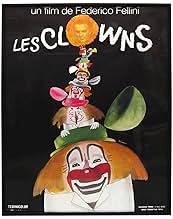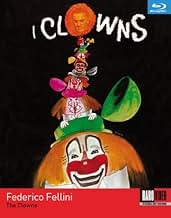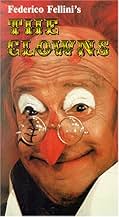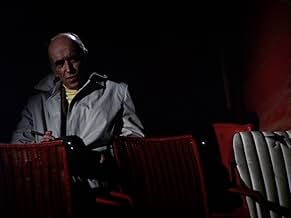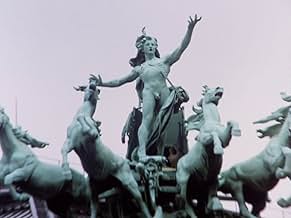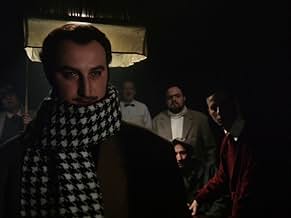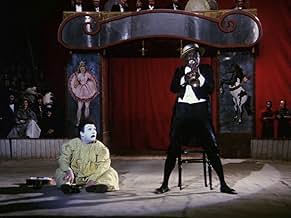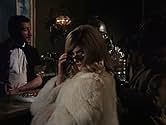IMDb RATING
7.0/10
3.1K
YOUR RATING
A ragout of real memories and mockumentary, as Fellini explores a childhood obsession: circus clowns.A ragout of real memories and mockumentary, as Fellini explores a childhood obsession: circus clowns.A ragout of real memories and mockumentary, as Fellini explores a childhood obsession: circus clowns.
- Director
- Writers
- Stars
- Awards
- 4 wins & 2 nominations total
Riccardo Billi
- Clown
- (as Billi)
Gigi Reder
- Clown
- (as Reder)
Tino Scotti
- Clown
- (as Scotti)
Carlo Rizzo
- Clown
- (as Rizzo)
Alberto Colombaioni
- Clown
- (as I 4 Colombaioni)
Giacomo Furia
- Clown
- (as Furia)
Dante Maggio
- Clown
- (as Maggio)
Galliano Sbarra
- Clown
- (as Sbarra)
Peppino Janigro
- Clown
- (as Janigro)
Nino Terzo
- Clown
- (as Terzo)
Osiride Pevarello
- Clown
- (as Peverello)
- Director
- Writers
- All cast & crew
- Production, box office & more at IMDbPro
Featured reviews
10EdgarST
A sentimental journey shot in France and Italy, searching the trace of the great clowns of yesterday, by one of the few filmmakers that showed his love for these performers in his own films, an affection that dates from a childhood experience in his hometown Rimini, which is lovingly recreated in the dream-like opening scene. Made for Italian television, the film shows Fellini meeting a few survivors, talking to clowns' relatives and friends, visiting white clowns, and recreating the style of the old art, as the funeral of a famous clown, that closes the documentary. He even finds and films Anita Ekberg, the star of his 1960 masterpiece, "La dolce vita" (I always thought he saw her a bit as a joke); but what I find curious is that his film crew seems to be integrated by a clownish crowd without make-up. Nino Rota contributed one of his most cheerful scores.
THE CLOWNS was originally made for Italy's RAI-TV. In this captivating movie director Federico Fellini, who also appears on screen as himself, portrays man's inborn fascination with the circus arena. The boy who escapes from his bedroom at night to sneak into the provincial circus is a figure of Fellini himself as a boy. Fellini spends time exploring some of Europe's great circuses and their best acts while unfolding once again his recurring theme of life itself as a quasi-liturgical circus-procession. All of Fellini's themes are here in pure distillation. THE CLOWNS is a documentary, a reminiscence, and poetry all at once. In the first part Fellini relates a history of the world of clowns and their unique brand of frolic-through tears. We see the austere Pierrot and his servant clown Auguste, the Fratellini family, the film clown Pierre Etaix, and are treated to Anita Ekberg buying a tiger at an Italian circus and a score of other outstanding episodes. The finale, with Fellini in view again directing the proceedings, like Guido in "8 1/2", is a melancholy clown funeral. Composer Nino Rota provides another appealing score as with so many Fellini films. This is a very accessible and delightful movie and stands beside Cecil B.DeMille's THE GREATEST SHOW ON EARTH as among the best in the genre.
Fellini exposes his great attraction for the clowns and the world of the circus first recalling a childhood experience when the circus arrives nearby his home. Then he joins his crew and travel from Italy to Paris chasing the last greatest European clowns still live in these countries. He also meets Anita Ekberg trying to buy a panther in a circus.
The overrated "I Clowns" is the weakest movie of Fellini that I have ever seen. This documentary is an absolutely personal and boring homage to the clowns and the world of the circus. Maybe Fellini had had a great satisfaction in this tribute since the theme was his childhood obsession; however I found it extremely painful to hear and watch after thirty minutes. If this documentary was a short, it could be more watchable. My vote is four.
Title (Brazil): "Os Palhaços" ("The Clowns")
The overrated "I Clowns" is the weakest movie of Fellini that I have ever seen. This documentary is an absolutely personal and boring homage to the clowns and the world of the circus. Maybe Fellini had had a great satisfaction in this tribute since the theme was his childhood obsession; however I found it extremely painful to hear and watch after thirty minutes. If this documentary was a short, it could be more watchable. My vote is four.
Title (Brazil): "Os Palhaços" ("The Clowns")
I was going to skip this one in my survey of Fellini films, but then I read the littlest bit about it and realized that I needed to watch it. It fit far too well into Fellini's thematic wheelhouse and sounded like it carried some of his later stylistic choices in their earliest phase (notably including himself as a sort of character). So, after some searching, I did find a copy with English subtitles, and I'm actually quite glad that I watched it. It's far from one of his best works, but it's warmly endearing towards its subject and carries the same kind of infectious energy that the best of Fellini's later works were filled with so easily.
It's called the first mockumentary, but I Clowns (pronounced like the English E, not the English I) exists somewhere in between genres and never really rests comfortably in one or another, much like Fellini's imagination seemed to operate. It is uninterested in being a straight narrative, a documentary, or even a purely surrealistic expression. Instead it exists in all three realms at once with Fellini spinning them like plates in a circus act.
So, the story that is there is that the character of Fellini (played by himself) is interviewing retired circus clowns to record some kind of oral history of the dying art form, but the movie actually begins with a staged sequence of Fellini as a child watching a circus tent rise from his bedroom window. He sees the show and cries out of fear when the clowns come to the ring and perform their feats. This is the only time that Fellini explicitly relates a personal emotion towards clowns, fear, but here he is as an adult making a movie about them and their history. The movie gets peppered with similar dramatic moments full of Fellini's familiar handling of camera, costuming, and performance as he recounts people from his old town of Remini that he considers to be clowns, or dramatizing stories from clowns about the past.
What ties them together is Fellini going around Europe with his crew, his script girl summarizing things directly into the camera while taking direction from Fellini himself, as they find the retired clowns of famous European circuses. Now, this is the part of the film that feels the most "real", but I'm never quite willing to believe that any of it is actually real, that the people he's interviewing were ever clowns at all. That blurring of the lines between reality and cinema seems to be the point, which is an interesting development for a director whose previous few movies have embraced theatrical affectation over strict reality. In these interviews, we receive a brief lesson on the tradition of specific clown acts with a lot of name dropping about this performer did it this way and that performer did it that way.
The movie's final major section shows a clown funeral done in the large center ring with a bevy of clowns performing their stage-managed bouts of sadness in extended detail. This is like the centerpiece of an actual clown act in a real circus, and it ends up feeling like an elegy for a bygone era. There had been talk and heavy implication of the idea that clowning was a dying form from the interviewees, and here we get a funeral for a specific clown done by clowns themselves. The act is an extravagant one that includes men dressed as horses, a large carriage, a sock gag on the corpse's foot, and a lot of chaos including cannons. It's to note that Fellini is in this scene and he just quietly sits behind the camera giving the very occasional direction, but I have to imagine that he was, in every shot he did not appear, giddy with joy as he watched the chaos unfold. The tender affection for the form and those who performed it is tangible and it all unfolds in signature Fellini style.
I do find the overall picture entertaining, but I do wonder what a more straightforward take on the history of clowning might show. As it stands, I can't believe any of the history told, feeling like the "narrator" is completely unreliable and that the whole show is a form of clowning with the audience as the joke. Still, if I'm to be the butt of this little joke, I'm okay with it. At least I laughed along the way.
It's called the first mockumentary, but I Clowns (pronounced like the English E, not the English I) exists somewhere in between genres and never really rests comfortably in one or another, much like Fellini's imagination seemed to operate. It is uninterested in being a straight narrative, a documentary, or even a purely surrealistic expression. Instead it exists in all three realms at once with Fellini spinning them like plates in a circus act.
So, the story that is there is that the character of Fellini (played by himself) is interviewing retired circus clowns to record some kind of oral history of the dying art form, but the movie actually begins with a staged sequence of Fellini as a child watching a circus tent rise from his bedroom window. He sees the show and cries out of fear when the clowns come to the ring and perform their feats. This is the only time that Fellini explicitly relates a personal emotion towards clowns, fear, but here he is as an adult making a movie about them and their history. The movie gets peppered with similar dramatic moments full of Fellini's familiar handling of camera, costuming, and performance as he recounts people from his old town of Remini that he considers to be clowns, or dramatizing stories from clowns about the past.
What ties them together is Fellini going around Europe with his crew, his script girl summarizing things directly into the camera while taking direction from Fellini himself, as they find the retired clowns of famous European circuses. Now, this is the part of the film that feels the most "real", but I'm never quite willing to believe that any of it is actually real, that the people he's interviewing were ever clowns at all. That blurring of the lines between reality and cinema seems to be the point, which is an interesting development for a director whose previous few movies have embraced theatrical affectation over strict reality. In these interviews, we receive a brief lesson on the tradition of specific clown acts with a lot of name dropping about this performer did it this way and that performer did it that way.
The movie's final major section shows a clown funeral done in the large center ring with a bevy of clowns performing their stage-managed bouts of sadness in extended detail. This is like the centerpiece of an actual clown act in a real circus, and it ends up feeling like an elegy for a bygone era. There had been talk and heavy implication of the idea that clowning was a dying form from the interviewees, and here we get a funeral for a specific clown done by clowns themselves. The act is an extravagant one that includes men dressed as horses, a large carriage, a sock gag on the corpse's foot, and a lot of chaos including cannons. It's to note that Fellini is in this scene and he just quietly sits behind the camera giving the very occasional direction, but I have to imagine that he was, in every shot he did not appear, giddy with joy as he watched the chaos unfold. The tender affection for the form and those who performed it is tangible and it all unfolds in signature Fellini style.
I do find the overall picture entertaining, but I do wonder what a more straightforward take on the history of clowning might show. As it stands, I can't believe any of the history told, feeling like the "narrator" is completely unreliable and that the whole show is a form of clowning with the audience as the joke. Still, if I'm to be the butt of this little joke, I'm okay with it. At least I laughed along the way.
As a great admirer of Federico Fellini, I was really taken with I Clowns. It is not one of Fellini's finest like La Dolce Vita, 8 1/2, Amarcord, Nights in Cabiria and La Strada, but has much to recommend it. I did feel at times that some of the dialogue collided into another bit of dialogue a little too much. And while certainly not amateurish at any rate I can think of other Fellini films better in this good, again not bad, actually it is skilled but with a somewhat grainy quality and lacking the dream-like feel of for instance 8 1/2. Faults aside, the costumes are stunning showing a lot of detail, while the settings are just as colourful. Nino Rota's scoring, which is largely made up of parts of his other works, is bright and cheerful, yet doesn't in any way undermine the melancholic ending. The structure of the story is much more focused than Satyricon, and while I did enjoy the documentary-like approach of some scenes, it was the personal and nostalgic charm that is part of Fellini's style all over that made I Clowns so intriguing. The clowns are interesting with more than them that meets the eye, they are not as easy to identify with as some of Fellini's other work but they are hardly detached either. The acting is engaging at feels at least naturalistic. All in all, largely successful and well done if not among Fellini's finest work. 8/10 Bethany Cox
Storyline
Did you know
- TriviaThis film has a 100% rating based on 19 critic reviews on Rotten Tomatoes.
- ConnectionsEdited into Fellini's Circus (2011)
Details
Box office
- Gross worldwide
- $284
- Runtime1 hour 32 minutes
- Sound mix
- Aspect ratio
- 1.33 : 1
Contribute to this page
Suggest an edit or add missing content


